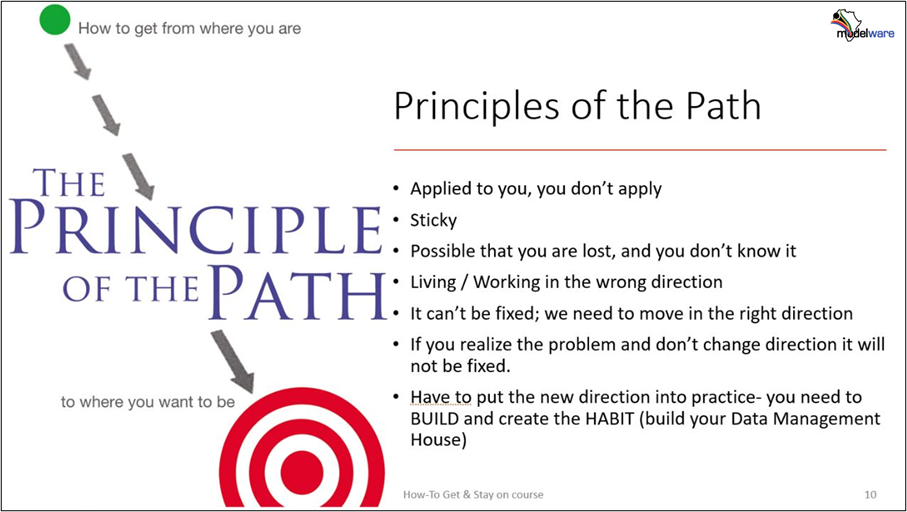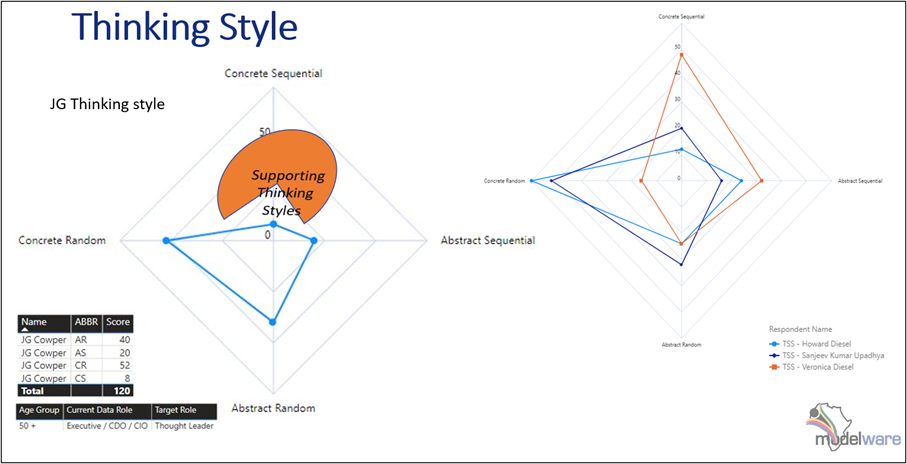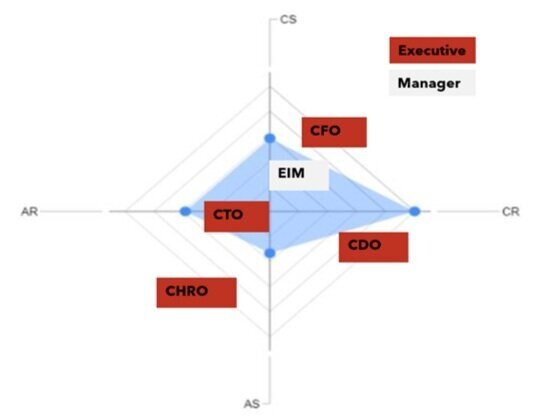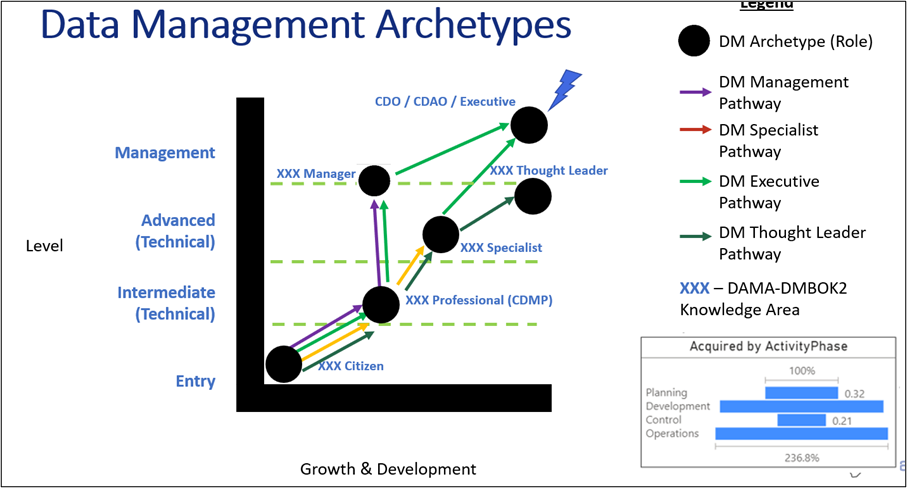Captain your Data Career
Executive Summary
Taking charge of the direction of your data career is crucial in today's rapidly developing world of data and AI. You cannot afford to let it just happen.
You need to understand your natural strengths, weaknesses, learning and thinking styles to plan where you will develop strategic competencies.
The webinar contains various topics related to career development, including the importance of communication skills, personal and professional growth, data-driven decision-making, mentorship, and strategic thinking. It also discusses typical challenges that CDOs, like @JG Cowper, face in navigating data governance and data product monetisation, tips for developing skills in data architecture and quality and presenting one's professional profile.
The significance of choosing the right career path and the importance of continuous growth and decision-making in one's career cannot be overstated. It is crucial to reflect on career choices and avoid having regrets. A personal reflection on career choice, particularly in the healthcare industry, also involves using data. A Chief Data Officer (CDO) also shares their journey from analytics to business unit, reflecting on the evolution of data and its impact on business decisions. Building superhero teams for data management through mentorship and understanding the CDO role and data management hierarchy are also important. Understanding levels and grades, as well as analysing Clifton's Strengths, is also crucial for success. It is also important to prioritise and deliver tasks efficiently, with the CFO, CTO, and CDO playing vital roles. Various approaches to studying and organising information can also be helpful for professional growth and development. The challenge of data governance, the need for data cohesiveness, and the importance of data architecture and learning in healthcare products should not be overlooked. Tracking work experience and skills is also essential, and exploring presentations, webinars, and skills in data disciplines can aid in personal growth. Finally, understanding team composition and delivery breakdown is critical, as is giving feedback on strategic thinkers in a group of graduates.
Webinar Details
Webinar Title: Captain your Data Career
Webinar Date: 1st June 2023
Webinar Presenter: Howard Diesel & JG Cowper
Meetup Group; Stretching your Data Management Career: Data Management Executives
Write-up Author: Howard Diesel
Contents
Executive Summary
Webinar Details
CDMP DIY DM Exam Prep Resources
Career Assessment and Active Learning
The Importance of Following the Right Career Path
Maximising Career Success through the Principle of the Path
Reflection on Career Path and Regrets
The Importance of Continuous Growth and Making Decisions in a Career
Personal Reflection on Career Choice and Applying Data in Healthcare
From Analytics to Business Unit: A Brave Journey of a CDO
Reflections on Running a Business with Data
Reflection on the Evolution of Data and its Impact on Business Decisions
Mentorship and Building Superhero Teams for Data Management
Critical Points for the CDO Role and Data Management Hierarchy
Reflections on the Importance of Understanding Levels and Grades and Analysis of Clifton Strengths
Observations and Insights on JG's Skills and Thinking Styles
The Importance of Purpose and Tools in Professionalism
Prioritising and Delivering on Tasks and the Role of CFO, CTO, and CDO
Aligning Purpose with Daily Tasks
Types of Approaches to Studying and Organizing Information
The Path to Professional Growth and Development for JG
Challenges in navigating data governance and data product monetisation
Importance of Data Architecture and Learning in a Healthcare Product
Tips for Achieving Professional Goals
Understanding the Journey from Acquired to Desired
Importance of Tracking Work Experience and Skills
Exploring Presentations, Webinars, and Skills in Data Disciplines
The importance of understanding team composition and delivery breakdown
Feedback on Strategic Thinkers in a Group of Graduates
CDMP DIY DM Exam Prep Resources
The DM Exam Prep Resources offer exam preparation resources, including practice questions and study materials such as summary notes, mind maps, videos, and slides. Candidates should have already studied the DM book or have aligned knowledge derived from the DMBOK. Feedback from beta testers has been used to improve the product.
Figure 1. Modelware's CDMP DIY
Career Assessment and Active Learning
During the discussion, Howard Diesel recommended seeking feedback from Johan or Paul regarding their thoughts on the effectiveness of the new learning format. Sadia shared her positive experience with the format, noting that it was engaging and distinct from traditional online or face-to-face learning. She preferred the active learning approach, which included taking tests, conducting research, and retaking tests to reinforce learning. Melinda also followed the test-taking approach but emphasised studying and note-taking. Johan expressed enthusiasm for Veronica's guidance and suggested adhering to her instructions. JG proposed the idea of incorporating a career assessment into the DIY program. Having completed most aspects of the program, JG required assistance with the final roadmap and deliverables. JG indicated that they would discuss the career assessment further.
The Importance of Following the Right Career Path
During the talk, the importance of being mindful of one's career direction was emphasised. The use of a map for managing data was suggested as a helpful tool. Howard also observed that individuals may sometimes be unaware they are pursuing the wrong career path. However, they clarified that previous work experience is not a waste of time. The focus was on the value of staying on the right track and avoiding distractions. JG's dedication to specific projects and engagements was praised. JG discussed the principle of the path and its relevance to career choices. This principle suggests multiple ways and the need to prioritise certain aspects of work. JG encouraged focusing on different aspects of data and improving in each area. Finally, Howard appreciated the concept of continuous self-improvement within one's job.
Maximising Career Success through the Principle of the Path
It is important to focus on the right direction to achieve career success. Professionals can get lost in their careers and need to remain focused. JG is an example of someone successful by being particular about their work and engagements. A concrete path of data management can help professionals focus on the right direction for them. Professionals can also improve their value, process, privacy, or governance while pursuing their current job.
Figure 2. Get back on track, make sure you are going in the right direction
Reflection on Career Path and Regrets
Howard likened this realisation of pursuing the wrong career path to taking a car to the workshop to fix its engine. Highlighting the importance of having to return to where you left off and starting in the right direction.
Howard shares a personal story about regretting not making certain career choices, which still affects them twenty years later. He admits to facing challenges in executive awareness and communication, especially when dealing with executives at the board level. Howard mentions management consultants from companies like KPMG, McKinsey, and PWC, who are known for their effectiveness and slick communication skills. However, he also mentions Dr Don Steenkamp's article, which blames management consultants for leading government companies in the wrong direction.
Howard admits regret for not choosing the right direction and opting to work in a laboratory at IBM instead. He expresses remorse for not being able to communicate effectively with decision-makers. Despite the regrets, Howard believes he can overcome the challenges and emphasises the importance of continuous growth.
The Importance of Continuous Growth and Making Decisions in a Career
It's important to strive for personal and professional growth in your job. If growth isn't achievable, it's important to communicate honestly with management. Coaching and mentoring can help with growth and assessing career goals can redirect your professional path. Every season of life offers opportunities for growth.
Many people feel frustrated when they find themselves stuck in the same routine at work, which can lead them to explore new opportunities. It's important to recognise when personal and professional growth has hit a plateau and to discuss this openly with management. If it's not possible to achieve growth within the current situation, it may be time to consider other options. Life offers opportunities for learning and development every season, and taking advantage of them is crucial.
JG has personally experienced the need to take breaks in their career to assess their direction and make crucial decisions. With a background in logistics, JG became a pioneer in data analytics within that sector. However, it was challenging. Despite their success, JG, who also has a medical background, has considered returning to healthcare. JG's work in logistics had a positive impact on supply chain visibility, benefiting multiple stakeholders.
Personal Reflection on Career Choice and Applying Data in Healthcare
Reflecting on their study of healthcare, JG contemplates applying data analytics to the field. They acknowledge the success of analytics in logistics and supply chains but need help identifying as either a logistician or healthcare professional. Taking a two-month break to reflect on their ambitions, JG proposes applying logistics thinking to healthcare data analytics. Balancing personal desires with analytics demand in logistics, JG values this introspection as a technique for future decision-making. JG's colleague Howard transitioned from the ITBI department to create and manage business reports in a separate department.
JG values the time he took to evaluate his career path and has used this technique several times. The Importance of Data-driven Decision Making
JG shares their experience of running the analytics division, where they proposed to run a business unit based on data. Despite initial scepticism from the CEO, the division grew faster than any others and spawned new ones. The speaker emphasises the importance of being brave and making pivot decisions based on data, encouraging others to embrace data-driven decision-making.
From Analytics to Business Unit: A Brave Journey of a CDO
As head of the analytics division, JG had in-depth knowledge of drug distribution nationwide. The South African pharmaceutical market comprises around 30 to 40 companies, with 80% of their products stored in a single warehouse. JG stressed the significance of data and analytics in making business decisions, considering it a crucial component rather than an add-on. JG felt frustrated when colleagues neglected the importance of analytics and relied on guesswork. To address this issue, JG suggested to the CEO to establish a business unit centred on data-driven decision-making. Under JG's leadership, the analytics team grew the division and introduced new divisions, such as Diagnostics and Therapeutics.
Reflections on Running a Business with Data
JG has been questioning if he has been building their career on the wrong foundation. They tested their hypothesis that running a business based on data yields better results than guessing. At first, JG had some difficulties while running various divisions for two months. However, they started seeing improvements in their decision-making and felt confident. As their success grew, JG realised the significance of data in their decision-making process and felt more secure in their career.
Reflection on the Evolution of Data and its Impact on Business Decisions
Around 8 to 10 years ago, teaching executives to make data-based decisions was a challenging and scary journey. Data wasn't as commonly used back then as it is today, and there were significant issues with supply chain visibility and combining different data sources. However, nowadays, executives are actively looking for ways to integrate data solutions into their decision-making processes. Data's growing awareness and importance have reduced the need to convince others to adopt data-driven decision-making. My experience of returning to the business after a break highlighted the rapid evolution of data techniques, from dimensional modelling to data lakes. Thankfully, people don't need to go through the same scary journey now - they can build on the knowledge and experience of previous generations.
Mentorship and Building Superhero Teams for Data Management
It is crucial to select mentors wisely to achieve success. Having a good mentor can be highly beneficial in helping individuals grow and develop their skills. It is vital to seek career guidance and mentorship throughout one's life. JG's Clifton strengths were showcased through the mid-journey tool, presenting a positive image. Open AI was utilised to create images for data management teams. The superhero card symbolises the necessary skills needed in the digital era.
Figure 3 Mentorship
Critical Points for the CDO Role and Data Management Hierarchy
As a CDO, it's essential to prioritise the strategic and business-focused use of data over pursuing AI for its own sake. A CDO's success hinges on effective data management and maximising data management efficiency.
The SFIA level hierarchy offers a helpful framework for evaluating individuals within a data management organisation, providing a straightforward means of assessment. The personal data management maturity assessment highlights the importance of team collaboration in achieving success and acknowledges the potential benefits of exploring new areas.
JG's Chief Data Officer expertise is measured and regulated within his current position based on his knowledge, skills, competencies, and abilities. JG cautions against suggesting radical changes in someone else's role.
Reflections on the Importance of Understanding Levels and Grades and Analysis of Clifton Strengths
I regret not knowing about levels and grades earlier, as it would have helped me find better matches and avoid constant toggling and switching. Understanding and navigating these layers can empower and reduce the need for trial and error. Finding a better way than constantly toggling is essential, according to my experience.
The Clifton Strengths analysis revealed four major themes: executing, influencing, relationship building, and strategic thinking. According to Howard, My Clifton Strengths focus on strategic thinking and relationship building, which are important for a CDO role.
A guiding coalition and connectedness are crucial in driving change within an organisation. However, differences in executing strengths can present challenges in project delivery. Howard shared his previous project experience with Paul and me, highlighting the challenge of aligning executing strengths for timely delivery.
Figure 4. Clifton Strength Four Domains
Observations and Insights on JG's Skills and Thinking Styles
JG has a natural talent for strategic thinking, building solid relationships, and influencing others. They possess the skills to persuade people and encourage them to support new directions. Additionally, JG is skilled at facilitating ideation sessions, where they can extract challenges and goals from participants. According to their assessment results, JG's thinking style tends to be more concrete and random. It's essential to note that JG has strengths in certain areas, while they may lack expertise in others. To complement their skills, JG benefits from having team members like Veronica, Sanjeev, and Howard, who possess complementary abilities. Effective teams require the capability to handle complexity and embrace diversity to adapt to different challenges.
Figure 5 Clifton Strengths by Domain
Figure 6. Thinking Styles for JG and required support
The Importance of Purpose and Tools in Professionalism
As we pursue our professional goals, we may encounter gaps that require attention. We can better align ourselves with our purpose by considering the appropriate Discovery Point and Decision Point. Passion and purpose are closely linked, with the latter serving as a guiding North Star. Utilising tools and resources can help us clarify and develop our sense of purpose. Embracing diversity becomes achievable by addressing our shortcomings using such resources. Depending on the task, specific skills may be necessary, such as proficiency in concrete sequential thinking when developing policies and procedures. While having the best person for the job is preferable, sometimes we must find ways to work effectively on our own.
Prioritising and Delivering on Tasks and the Role of CFO, CTO, and CDO
Prioritising and ensuring the timely completion of tasks is crucial, even when needing more expertise or resources. Adopting the KSEA (Knowledge, Skills, Competencies, and Attitude) mindset can lead to optimal outcomes.
Although the arrangement of C Suites (CFO, CTO, CDO) on a slide may seem perplexing, it serves a purpose. While the CFO and CTO roles are clear, the CDO may seem disconnected but requires a governance manager or EIM manager to align with the strategy.
Veronica is a person who values orderliness in her work environment and prefers information presented in a linear, sequential manner. She finds satisfaction in completing tasks and values organised information.
Figure 7. Typical Role and Thinking Styles Mappings
Aligning Purpose with Daily Tasks
The speaker believes that aligning daily tasks with one's purpose is essential and that tools and diversity can help with this. Different roles require different skills, and individuals should find the right time to complete concrete sequential work if the best person is unavailable.
Types of Approaches to Studying and Organizing Information
When it comes to learning, there are two main approaches: sequential and random. Sequential learners start at the beginning of a textbook and work through it in order, while random learners jump around but still manage to grasp the necessary knowledge.
Individuals who prefer random thinking tend to thrive when given multiple tasks, whereas those who prefer sequential thinking may feel overwhelmed by working on many things simultaneously. In this case, JG struggled with project management as it required immense energy to keep everything in line.
Abstract and concrete thinking are two different styles of thought. Abstract thinkers prioritise team dynamics and can perceive subtle emotions, while concrete thinkers focus on facts and see things in black and white.
The Path to Professional Growth and Development for JG
To achieve his desired professional level, JG should consider taking specialist exams or obtaining certificates at the next level. He must decide on the best pathway to take for planning, development, control, and operation. It is essential to discuss where JG sees himself in 10-15 years, such as becoming a thought leader or a manager.
JG should prioritise data governance, strategy creation, building an operating model, and ensuring the proper functioning of the data management department. Additionally, he should consider data value realisation and data ROI since he is more inclined towards analytics than data management.
To ensure professional growth, it is recommended that JG join an organisation that requires a CDO Gen 2 and choose projects in relevant areas. By doing so, he can achieve his professional goals and succeed in his career.
Figure 8. Defining the Growth path
Challenges in navigating data governance and data product monetisation
In their reflections, JG has been bouncing around and struggling to navigate the challenges of data governance. They express a need for assistance with data governance so that they can focus on monetisation and data products. As a CDO, JG emphasises the importance of getting the job done, even if they need to handle every aspect themselves. JG mentions packaging analytics and tools into a data product that can be transformed into a commercial entity. However, JG highlights DAMA-DMBOK's limitations in addressing the linkages with data products. The need for a data code and establishing a separate data company is discussed as a solution for managing risk and conflicts of interest. The English Premier League's data code setup is given as an example of monetising data. It is important to look beyond the DAMA-DMBOK and explore other areas for creating capabilities.
Figure 9. JG's CDO planning
Importance of Data Architecture and Learning in a Healthcare Product
When providing a comprehensive healthcare product, it's important to identify the legal entity responsible for engaging with pharmaceutical companies and original equipment manufacturers (OEMs). Direct engagement with doctors is not allowed, so it's crucial to focus on the value and sustainability of the product.
To grow professionally, it's vital to continue learning about data architecture, modelling, and data quality. Data architecture is a crucial factor in turning business requirements into technical implementations. Developing expertise in dimensional modelling and data quality is the next step.
Conducting a personal maturity analysis can help determine individual goals for data management and desired growth.
Tips for Achieving Professional Goals
Assess your job requirements, determine your current and desired level of expertise, identify gaps, and develop a plan for success. Use a Personal DMMA tool to create an aspiration plan for yourself and align it with business needs. Create a data talent strategy and identify necessary skills for the team. Have in-depth discussions with your team to understand their aspirations and develop a plan for them.
Understanding the Journey from Acquired to Desired
It is vital to assess oneself to understand one's current level of knowledge and skills. This helps one identify what to acquire to fulfil their desired role. Recognising the areas where one's current capabilities fall short of the job requirements is crucial for professional growth. Developing a strategic plan to bridge the gaps and progress from the acquired level to the required and desired levels is essential. Utilising a personal Data Management Assessment process helps individuals set aspirational goals and articulate their desired career path. Balancing personal aspirations with the needs of the business is a powerful way to create a data talent strategy that benefits both parties. In-depth discussions and collaborative efforts are necessary to understand each individual's journey and determine how to support their advancement. Integrating the organisation's data strategy with data talent development is vital for achieving overall organisational goals. The journey requires continuous learning, skill development, and aligning personal growth with the evolving needs of the business.
Figure 11. Professional Data Management Maturity Assessment (PDMMA) Risk
Importance of Tracking Work Experience and Skills
Determining risk ratings through data governance can help pinpoint areas that require attention to achieve desired outcomes. Specific actions and tasks must be carried out at various levels (levels 3, 2, and 1) to complete the necessary deliverables. Startups may need help selecting projects that align with their goals and aspirations. It is vital for both the business and HR to manage and align projects with desired outcomes. Keeping track of work experience, knowledge, skills, and competency levels is crucial for interviews and career development. Additionally, maintaining a record of achievements and areas of expertise simplifies presenting qualifications in interviews.
Figure 12 Desired Deliverable Attention Analysis
Exploring Presentations, Webinars, and Skills in Data Disciplines
During a discussion, Howard shared their experience with local and international presentations. They discussed organising webinars to consolidate their knowledge area and display their work. Howard emphasised their certifications and skills, specifically in electrical engineering and computer science. They also discussed the significance of work experience and their various roles in different institutions. Howard mentioned having a change management attitude and stressed the importance of data visualisations in CVs.
JG expressed the need to explore various capabilities within data disciplines and reflect on their areas of expertise. They questioned the meaning of proficiency and shared their thoughts on the future employment of data professionals. JG expressed excitement about the potential to evaluate the competence and the importance of production in data modelling and AR.
Figure 13 KSCA (Knowledge, Skills, Competencies and Attitudes) Summary
The importance of understanding team composition and delivery breakdown
During a recent presentation, JG emphasised the importance of blending teams to create a positive client experience. He also highlighted a data fantasy league and praised some fantastic initiatives in South Africa. The audience was asked if they recognised the value of strategically planning their teams and careers. JG stressed the importance of starting the journey right for young graduates, mentioning a young crowd in the company. Veronica shared her experience teaching graduates and opening their eyes to future possibilities. The graduates were selected for their strategic thinking skills and had different aspirations, strengths, and interests. The positive impact of strategic thinking was communicated to the HR department.
Feedback on Strategic Thinkers in a Group of Graduates
It was impressive to discover a group of graduates skilled in strategic thinking. They were specifically selected for this quality.
JG is content with his current role and feels grateful for the opportunity to be in this position. Despite experiencing challenges in his career, he has learned from them and accepts the scars they have left. He believes it is essential for others to appreciate the privilege of gaining a unique perspective.
Howard expresses his gratitude towards everyone who participated in the session and eagerly anticipates the next one.
Please reach out to us if you would like to partake in a career and data maturity assessment
If you want to receive the recording, kindly contact Debbie (social@modelwaresystems.com)
Don’t forget to join our exciting LinkedIn and Meetup data communities to not miss out!














